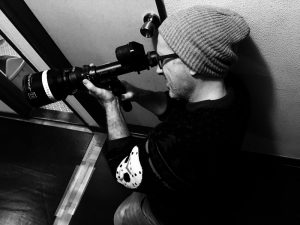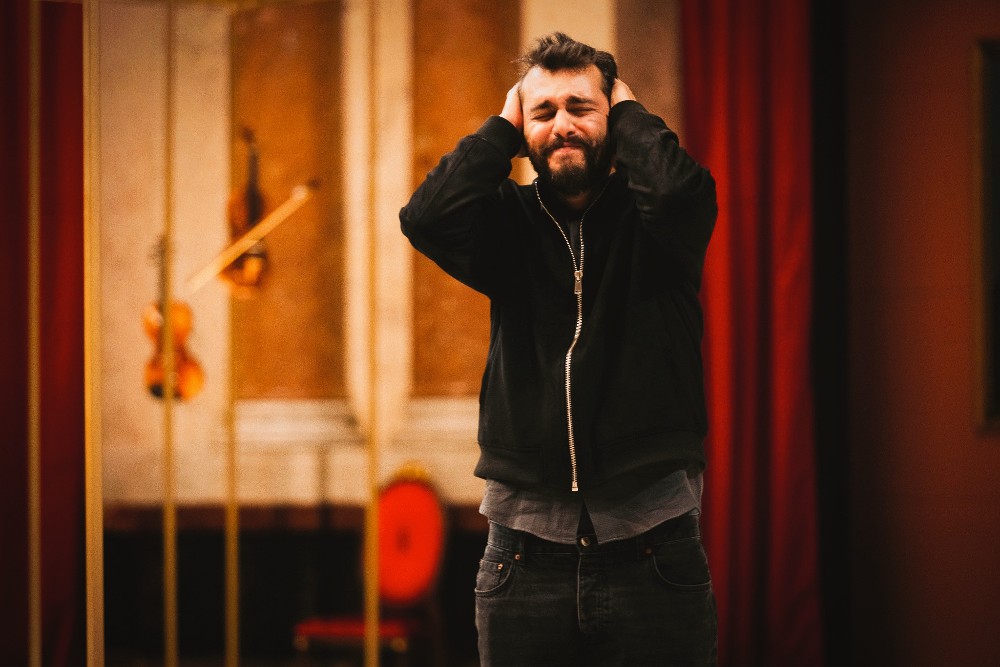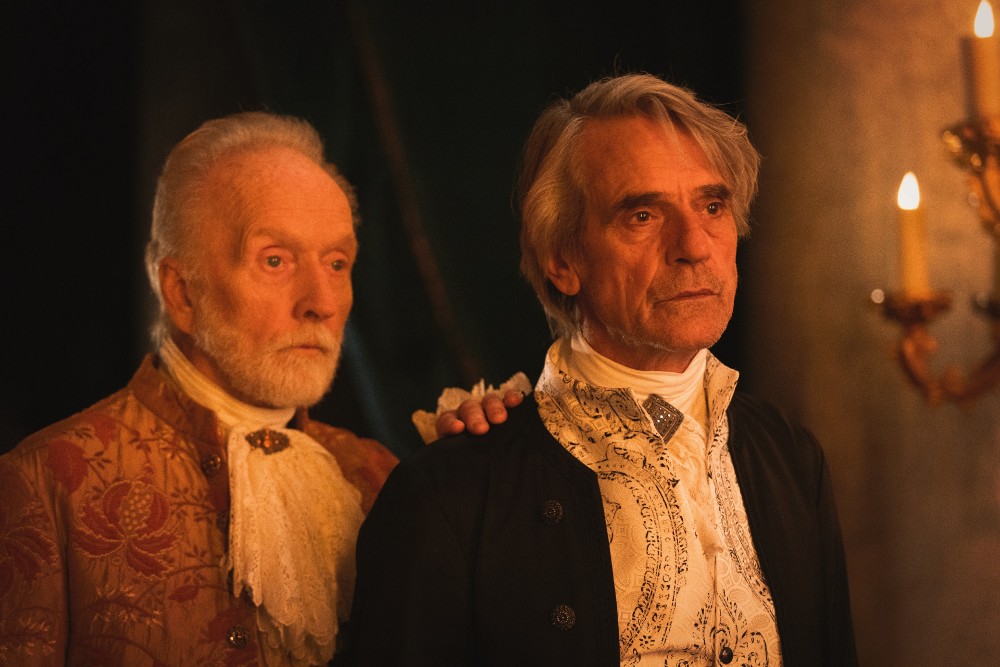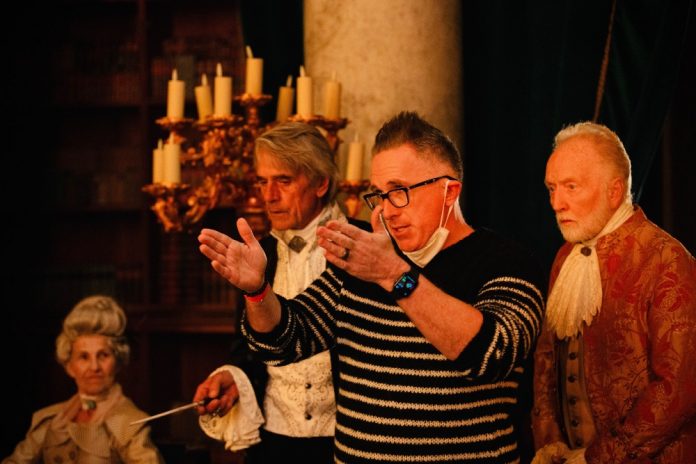When it comes to horror, filmmaker Darren Lynn Bousman has pretty much done it all, from directing four installments of one of the most successful horror franchises of the 21st Century (i.e. the Saw franchise) to directing not one, not two, but THREE horror musicals. There’s a remake in there, and a lot of other odds and ends, as well.
His latest horror film is The Cello, a horror movie set in Saudi Arabia, following a cello player named Nasser (Samer Ismail) who finds a beautiful blood-red cello in a local shop (run by Tobin Bell aka Jigsaw from that aforementioned franchise) that turns out is possessed by a demonic spirit. As people start dying around Nasser, he must track down the cello’s origins and figure out how to stop it.
Also starring Jeremy Irons, The Cello is another production made under Saudi Arabia’s new initiative to reach out and get Western productions to film there. Another recent one is Ric Roman Waugh’s Kandahar, starring Gerard Butler, which was released over the summer, and there’s much more to come.
Above the Line spoke with Bousman over Zoom last week for the following interview.

Above the Line: We haven’t spoken in quite some time, but I actually enjoyed Spiral and hoped to talk to you about that, but that didn’t happen.
Darren Bousman: That was a crazy thing. That movie still makes me sad, the fact we shot it, they did the marketing campaign, and then COVID hit. They already basically lifted their kimono to show everything, and then we have to wait a year for it to come back out. That whole thing makes me very sad.
ATL: It also bummed me out, because I liked the new movie fine, but I liked that you did something so different.
Bousman: That was what we tried. I’ll say this. What sucks about what happened with Spiral is I think that fans wanted Saw X, they wanted Jigsaw, they wanted Amanda. I think that in retrospect, if that would have been known that was coming out, or even if they came out relatively at the same time, you would have had a much different reaction to the movie, because I think that fans are so smart that I think there was that hope that it was going to tie into Jigsaw, that you were going to have a cameo from Jigsaw and it was all gonna go back together. The reality was, we went out of our way to say, “No, there’s no Jigsaw, there’s none of that. This is its own thing. It’s Spiral with Chris Rock.” So we live and we learn.
ATL: But you got to work with Tobin again for The Cello, which is another bit of a departure, so how on earth did you end up in Saudi Arabia, making this horror movie, which I’m not sure, but is it the first horror movie ever made there?
Bousman: Yeah, it is. I have no fucking clue what happened. I woke up, and it was hot outside and I was like, “Where the fuck am I?” As all things I’ve ever done come together, it’s out of the box and weird, and it makes no sense, and it would never happen again. I got a phone call from a friend of mine, a guy by the name of Spooky Dan, he calls me and goes, “Hey, listen, I got a weird thing for you. Someone reached out to me to ask if I would introduce you. He’s got a movie.” Usually, when you get those phone calls, it means some guy wants to go make a movie on his camcorder and has no money. Spooky was like, “Listen, hear me out. You got to go to Egypt to meet him.” And I was like, “Egypt?” “He’s gonna pay you. You’re gonna go to Egypt, you just gotta go meet the guy.” And so I was like, “I’ve never been to Egypt, that sounds kind of awesome.” So I flew to Egypt, and I met this writer, Turki Al Alshikh, who we ended up bonding immediately.
At the time, I didn’t realize who he was, how big he was, and his role into transforming the Middle East into an entertainment hub. We just talked movies for two days. We just basically geeked out I felt that the barometer of how to explain him is he is like talking to Quentin Tarantino. He knows everything about every movie, down to the minutia details about it, so I knew that I was in good hands.
The original concept was we were going to shoot the movie in Egypt, and we had started off to translate a Darren Bausman version of the film. I was working with him in Egypt, then he presented me the idea that it was posing an issue to get some of these locations that we wanted in Egypt. “Why don’t we go to my home country, and we’ll do it there and you’ll have no issues anywhere? You want to shoot, the entire country is open to you. Let’s just go fly there and see it.” Originally, I was like, “No, I’m not going to fly there.” And he’s like, “Just go. Trust me. If you don’t like it, we’ll figure it out.” I went there and in about 12 hours after hitting the ground, I was blown away, shocked. I guess my own incompetence in the world and geography, I only knew of Saudi Arabia, what I’d seen on the news and on CNN, and recently they’d been in the news.
To go there and see… the only way that I can describe it for it make sense is it felt like I was standing in the middle of a renaissance, where, for years, there was not art or entertainment. There wasn’t music when you went out, there were no movie theaters. There was no theater going on like that. Now, you go there and in the last five years, music is everywhere. Concerts are everywhere. Movie theaters, AMC is opening up everywhere. All the people that live there are outside and excited, because now they’re getting to experience these things from all over the world. It just felt energetic is the only way I can describe it. The other thing I loved about it was I’ve shot all over the world, but the two primary places is LA and Canada. There is a level of indifference, but in Saudi, there was excitement every time someone saw a camera, and it was brand new to them, so people bent over backwards to show the best of everything. It was amazing to me, because in Toronto, sometimes you’d feel inconvenienced, like, “Oh, great. They’re blocking this street.” Here, there was so much excitement around everything, and it made me excited as a director because you feed off that energy. One day I wake up and it’s 110 degrees outside and I was like, “Fuck, I’m making a movie here. This is crazy.” But it was fascinating that we got to shoot in places that had never allowed filmmakers to go before. They opened up places to us like Al-‘Ula, which is kind of in the second half of the movie, they fly to Al-‘Ula, and that’s all the desert stuff, That had never been filmed like that before. They never let a narrative film go in there. So to be there, standing in these very sacred places, filming this thing, was just kind of … as a kind of geek like myself that likes to travel, it just felt surreal. It was a crazy and fascinating experience.

ATL: I have a filmmaking friend who also made a movie there a couple years ago, the movie Kandahar…
Bousman: Gerard Butler’s thing, right?
ATL: Did your production crossover with them at all?
Bousman: I believe that Kandahar was going right when we started. We were the first and then four movies came pretty much after the back of us. Joe Russo‘s Cherry did some second unit stuff over there, but if you look right now… today, as of right now… Johnny Depp is there, Baz Luhrmann is there. Eminem is there. It feels like overnight, but it’s been years now. They have basically turned it into this very artistic friendly place that they’re trying to get artists to come to film and to do concerts. And it’s crazy.
ATL: How about casting? Did this writer have all the connections to help with casting? You brought over some people from outside, like your DP, Maxime Alexandre.
Bousman: I brought over a handful of people. I brought over Maxime, because I’ve been a huge fan of [him]. Maxime has actually been attached to a couple of movies that never ended up going of mine. This was the first one that we actually got to work on together. That was something where I felt like a fish out of water. Because there’s not an infrastructure there yet. There’s not an infrastructure of moviemaking. It’s not like here, where there’s 5,000 makeup artists you can pick or your choice of grips or gaffers. The population of crew was a challenge. A lot of people had to fly in from other parts of the world, and they would train then young, new Saudi filmmakers, how to do these things. The casting came from the writer, Turki Al Alshikh, who has his finger on the pulse of all Middle Eastern cinema and TV. He literally was able to put together a cast of the Tom Hanks, for example, of Syria, the Meryl Streep of Kuwait, the Christopher Walken of wherever. He brought these people in, and they were all these superstars over there. It felt like this hodgepodge of different people from different backgrounds, in different cultures making this film together, and it was such a fascinating learning experience for me, because my job coming in there was to try to tell an engaging story, based on my knowledge, and my knowledge is Western. Then you have all of these people that have lived their own stories in their own culture, and they’re bringing that in there. And then, this meeting of all of our minds to say, “Where is that point that we all converge, that someone in my side and your side will all understand this?”
And that, to me, was fascinating. There were a lot of moments where I had concepts that didn’t translate. I don’t mean words that didn’t translate – concepts, ideas, emotional things – that just wouldn’t work over there. And vice versa. They would come to me with ideas, and I’d be like, “That will never work. That will never play [for] an American audience doing that.” So I think that there was this real collaborative effort on all sides, from so many different countries, coming together to try to make this film. That was also kind of crazy to be a part of that. At the very end, we took a picture of one person from every country that was involved, and the picture is hundreds. I’m talking from Germany, from China, from United States. from Italy… it was crazy the amount of people that worked on this.

ATL: That’s a good segue. Was it hard getting Tobin and Jeremy Irons out there to do this? Or did you do some shooting back in the United States with them?
Bousman: There’s always that initial shock, I think, specifically this early on in what Saudi is doing by saying, “Hey, come over to Saudi Arabia.” Like me, I think that people, all they know about it is what they’ve seen on TV. Once you’re there, about 15 minutes in, you realize that it’s very similar. You walk outside, you think you’re in New York or Los Angeles. It’s a 27-hour flight from LA, so that’s intense. It’s not as simple as going to Toronto. But no, we shot the movie in about five weeks in Riyadh, about a week in Al-‘Ula, and then we went to Prague, shot half the movie in Prague, and then later we went to Ireland, and shot in Cork, Ireland. And then Maxime did some stuff in Italy. It was kind of all over the place where we shot this thing, and again, for me, as just a kid watching horror movies, to be able to travel to all these places and kill people in them was a dream come true.
ATL: I have to ask about the music, because you’ve obviously made a couple musicals, you worked with Charlie Clauser a lot. I’m not sure if you’ve worked with Joseph Bishara before, but he’s scored a ton of horror. Can you talk about how you decided to approach the music for this, which includes some original compositions, some Middle Eastern music, etc?
Bousman: Joe doesn’t tiptoe when he dives in. Joe and I first worked together on Repo: The Genetic Opera. He was one of the music producers on it, and then Joe came on for The Devil’s Carnival. He did do one of my early scores on… we have to do another interview on this movie because I’ve got stories. A movie I did a long time ago called 11:11:11, but he has not worked with me as a composer for a while. I knew that I wanted the score to have a very evil demonic-sounding thing to it, but I also wanted there to be melodies, and I wanted live orchestration. I did not want MIDI; I did not want canned sounds. One of the cool aspects of this was the working between Joe Bishara and Urban Audio, who did the mixing of it. I wish that everyone could experience this movie in 5:1, because what happens in 5:1 with The Cello is something that Joe and I worked on for a while, which was trying to put decibels and frequencies in the music that subconsciously fuck with you, that you really hear it in the subs and the 5:1 if you’re watching it in [that format].
Joe did some research into the instruments of the region, and he found some “oohs” and a couple other things, and then he hired session players to actually do those, to mix it in with the idea of a cello. He tracked this entire storyline with the cello, how the song will start off repetitive, and then it begins to go in different places and mix it with growls and guttural sounds. I remember the first time we all heard the score, and specifically Leonardo’s Requiem piece, it was intense. Joe, he made the music in this thing, not only a character of the film, but one of the main driving forces of the movie. Joe’s amazing.
ATL: It was great talking to you. I didn’t realize you had been working with Joe long before all the Conjuring movies and other stuff, so you broke him in.
Bousman: Joe and I are very good friends. He has been a very close friend for a while. We’re working together on something new now, so we will see.
The Cello opens moderately across the nation on Friday, Dec. 8.



